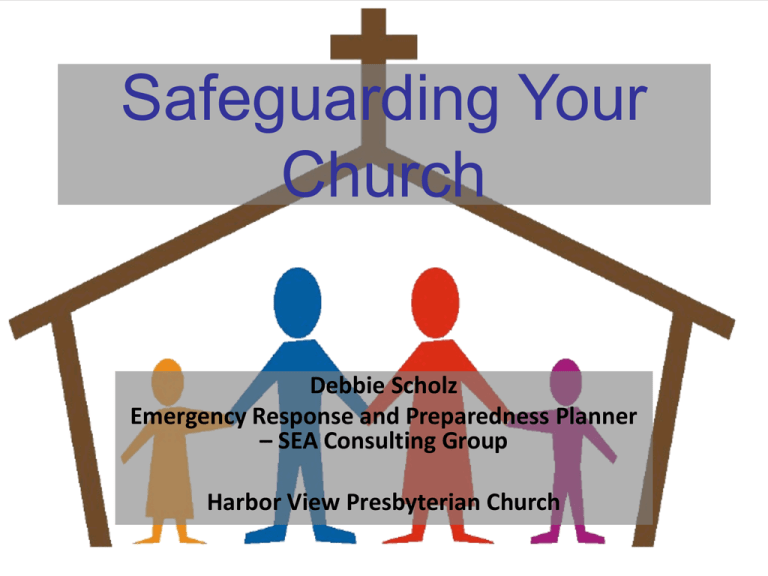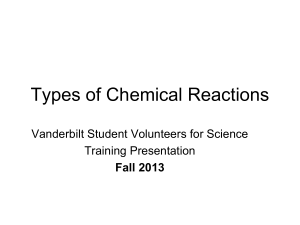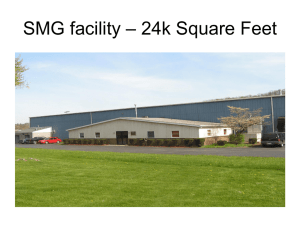Safeguarding Your Church - Harbor View Presbyterian Church
advertisement

Safeguarding Your Church Debbie Scholz Emergency Response and Preparedness Planner – SEA Consulting Group Harbor View Presbyterian Church Purpose • To provide you with ideas, tools, and guidance on how to best protect the property and people of your church from: – – – – – – Thefts Accidents Mis-use of Facility Assault / Injury Fire / Natural Disaster Other Agenda • Topics Being Addressed in this Presentation: – Physical Plant Safety – Corporate Safety Policies • Member Safety • User Safety Requirements and Policies – Insurance Review / Audits – Training Education Needs – Update and Maintenance of Plans and Policies Won’t Happen Here Attitude • It won’t happen here. • If it does happen here, it won’t affect me. • If it does affect me, it won’t be that bad. • If it is that bad, I can’t do anything about it anyway! WRONG! Disclaimer • There is no such thing as 100% effectiveness! • Security is a component of Safety. • Security and Safety are attitudes ALL staff and congregation members must adopt – otherwise you are doomed to fail. • Complacency Encourages Crime. Bottom Line – your church is not a prison and should serve your community and membership, but you need to minimize your potential loss risk! Systematic Approach • Keys to Achieving a Safe Church: – Utilize a Planning Cycle – can’t do it all at once! – Many of the topics in this presentation are common sense items…regular maintenance / oversight is required Step 1: Planning • You probably already have many of these items in place or underway – may just need to be formalized • Many of these items in this presentation are common sense requirements… – Most Insurance Companies now require the use of Best Practices for Church Safety • See what other churches already have – don’t have to re-invent the wheel – Steal Shamelessly from others and customize for your purposes • Reach out to your local Emergency Planning Department (EPD, Fire, Police – often your own members) for additional information / guidance – Legal Review of all plans/policies is highly recommended Planning Corollaries 1.Plans are only as good as the information incorporated into them 2.If you don’t use and/or maintain a plan, it is essentially a “door stop” – not much good for anything except holding the door open 3.“Safety is not a passive strategy” 4.“Hope is not a strategy” when addressing planning needs Physical Plant Safety • Conduct Internal Audit of Facility: ($ to $$$$) – Secure the facility – general (regular) maintenance is key: • Repair broken windows, doors, locks, etc. • Remove bushes and shrubs that block doorways and line of sight • Ensure all trees and shrubs are well pruned, especially near outbuildings • Fencing and gates operational and utilized effectively – Identify and address “Slip, Trip, and Fall” hazards internally and externally from: • Rain / Snow / Ice • Localized flooding and drainage issues in parking lot, egress areas, etc. Physical Plant Safety, Cont. – Lighting ($ to $$) • Replace all burned out bulbs / lights regularly • Incorporate motion-detection and emergency lighting at all ingress and egress points, bathrooms, etc. – Hard-wired lights – Solar lights Physical Plant Safety, Cont. – Signage: ($ to $$$) • Clearly mark facilities, internally and externally – Are signs clean, clear, and readable? From a distance? Up close? – Spelled correctly? – Attractive and Professional? – Do they direct people to where they need to go? – Are lighted signs working? If not repair / replace “Signs! Signs! Everywhere there’s signs. Blocking out the scenery, breaking my mind Do this, don’t do that, Can’t you read the sign?” Physical Plant Safety, Cont. – Access Controls: ($ to $$$) • Alarm Systems – (Fire / Security) • Panic bars with alarms for exterior doors • Provide view windows for all interior doors – Must be able to see into all rooms from outside Physical Plant Safety, Cont. – Develop Strict Key Control Policy: ($ to $$) • How many people have keys to your facility? – – – – Master Keys Main Ingress / Egress doors Interior Rooms Other • Do you have a list of all keys and who has them? • Are they numbered / accounted for? If not, its time to Re-Key! Physical Plant Safety, Cont. – Develop and maintain complete inventory of all Church property: ($) – – – – – Electronics (computers, copiers, A/V Equipment, Phones, FAX, etc.) Music (sheet, choir, other) Furniture Room by room Facility design, upgrades, HVAC systems, etc. • List brand, model and serial numbers, value, # of copies, etc. • Photograph and video inventory also recommended • Inscribe electronics and furniture with church name, phone number or use “Property of” tags • Maintain several copies – don’t put all of your eggs in one basket! • May want to provide CD copy of all files to your Insurance Company Example Equipment Inventory Example Photo Inventory Physical Plant Safety, Cont. – Copper Thefts: ($ to $$$) • A/C system thefts can cause $3,000 – $75,000+ in damages per event – – – – – 8/2009 - $1M copper stolen from School construction site - Greenville 12/2009 - $60-70K in AC unit theft – Summerville 7/2010 – Copper water pipes stolen from home – Charleston 8/2010 – Copper removed from A/C unit - Charleston 8/2010 – Copper gas line stolen from home – Charleston • Copper downspouts, copper roofing, etc., are also targeted Physical Plant Safety, Cont. – Copper Thefts, Continued: • In 2007, the U.S. Department of Energy called copper theft a $1-billion problem that was getting worse (DOE, 2007) • Many churches in the Charleston Atlantic Presbytery have experienced these thefts • Insurance deductibles are often high…severely impacting the affected facility Physical Plant Safety, Cont. – Guard Against Copper Thefts by: • Installing lights, trim shrubbery to provide visibility of copper sources • Protecting A/C units with locked fencing or cages – leave room for servicing • Consulting with alarm companies for additional protection options Physical Plant Safety, Cont. – Church Vehicles and Trailers: ($ to $$$$) • Stealing, outright • Removal of equipment • Vandalism • Destruction • Other Physical Plant Safety, Cont. – Church Vehicles & Trailers Theft / Vandalism Protection • • • • • • Enclose vehicles / trailers with fencing Secure vehicles with alarms and CLUB on steering wheel Park in place visible by passing motorists / residents Engrave / weld name onto trailers / frame or etch windows Mark trailers with special paint-jobs, decals, lettering, etc. Spray paint name / phone number inside of trailer in fluorescent paint • Obtain license plates for trailer – so serial / VIN number on record Physical Plant Safety, Cont. – Church Historical Data • Church Registers and other data for your church • Is this information archived anywhere? Is it stored in a secure place resistant to fire / flooding? – Most churches only have electronic records from mid 1980’s forward – often these are stored on media that you can nolonger retrieve – Established back-up procedures? – Have you identified who has copies in case of evacuation? – Alternate storage site for all information (on line? Member home?, Pastor, etc.?) Physical Plant Safety, Cont. – After doing initial Physical Plant Updates, Request a Crime Prevention / Security Survey: ($) • Free Audit by Charleston Police Department – previously by Sgt. Trevor Shelor (SHELORT@ci.charleston.sc.us) or • Use other Security Company Privacy = Opportunity = Crime Risk • Build “Layers” of protection to reduce risk • Should address: – Thefts / Vandalism / Security issues by “unauthorized persons” – defined by CCPD as thieves, vandals, beggars, homeless persons seeking shelter, pedophiles, non-custodial parents, violent individuals, or curious trespassers Corporate Safety Policies • Develop Plans / Policies for your Church. Examples can include ($ to $$): – – – – – – – – Employee Manuals Elder Manuals Disaster Response Plans / Hurricane Plans Continuity of Operations Plans (COOP) – Business Continuity Communication Plans – emergency contact teams Member Care Plans Credit Card Use Policy Vehicle Driver Certification Policy – required for use of Church vehicles when transporting members or other individuals Corporate Safety Policies – – – – – Data Security Management Policies Church Key Control Plan Worship Service Safety Plans Parking Lot Safety Plans Facility Use Policy • • • • • Meeting Use – BSA, GSA, NA, AA, Etc. Weddings Funerals Visiting Groups / Mission Groups Facility Rentals – Other (e.g., use of gymnasium for basketball, aerobics, etc.) Corporate Safety Policies, Cont. – Member Care Policies provide unified safety / security for all members and facility users • Covenant of Care Policy with Children, Youth, and Vulnerable Adults (or similar) – for on-site and off-site activities – Training and education requirements ($ to $$) – Background checks (DSS and National Offenders List) ($ to $$) – Hard to achieve at all times – but necessary Expect push-back from members – NOT POPULAR May be required from insurance standpoint Insurance Reviews / Audits • Establish Committee to annually review insurance requirements / needs for your Church. This may include but is not limited to: – – – – – – – – Commercial Property – Building and Contents Hurricane / Wind & Hail Earthquake Commercial General Liability & Additional Liability Coverage Automobile Insurance Workers Compensation Umbrella Policy ? Insurance Reviews / Audits, Cont. – Understand Limits and Exclusions of Policies • What is the deductible for each component? Can your church budget afford a deductible of 2-12% of total value from a fire or natural disaster? – $50,000? $120,000? $200,000+ • Replacement Cost or Current Value? • Loss of Income • Who is allowed to drive Church vehicles? Are there any restrictions or training required? – Conduct insurance audit with Insurer – evaluate the realities of your situation annually ($ to $$$$) Step 2: Implementation • Provide information and training to staff and congregation for new policies and plans – Keep everyone informed – Use what you already have in place for communications in your church • • • • • • • Announcements in Church Bulletins News letters Church gatherings / events Mailings Websites Social Networking – facebook, Twitter, etc. – Where necessary, conduct training on the material – Get the word out using all means available! Step 3: Evaluation • Conduct Annual Reviews of all plans, policies, and protocols (at a minumum) • Most plans are living documents – and should be modified as circumstances warrant: – Collect all changes and lessons learned from the year and ensure that these changes are reflected in your planning documents and procedures – Review Insurance requirements relative to your existing policies – Are all plans still necessary? – Are there new components of your church life that needs to be addressed? – Have significant losses been incurred? People, financial, facility, etc.? Did these losses change your Church operations? Step 4: Review & Update • Release revised plans – ensure that date stamp or version number is incorporated into document – Provide Education and training updates to staff and congregations on changes – make it easy for everyone to be informed: • • • • • • • Announcements in Church Bulletins Newsletters Church gatherings / events Mailings Websites Social Networking – facebook, Twitter, etc. – Post finals to website (where applicable) and maintain print copies in Church office for easy access For More Information • Contact Other Churches in your area for copies of their existing planning documents • Visit Church / Presbytery Websites for additional ideas • Contact Local Emergency Planners / Law Enforcement Agencies for ideas and information • Contact your insurance agent for information Thank you For copies of this presentation or for copies of documents discussed in this presentation, contact me at: Debbie Scholz dscholz@seaconsulting.com 843-367-5126 Ms. Scholz is an Emergency Response / Preparedness Planner with SEA Consulting Group here in Charleston, SC for more than 18+ years and is the current chair of the Harbor View Presbyterian Church’s Administration Committee that oversees these plans, policies and associated documents.










